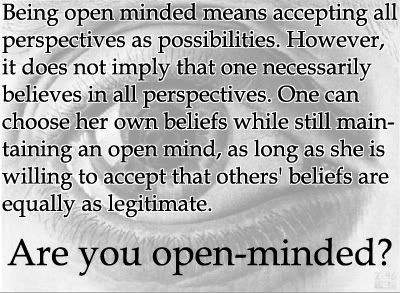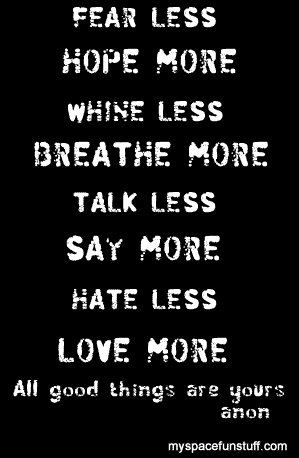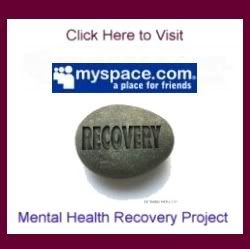I recently experienced some significant-yet-positive life changes, so there hasn't been much activity going on at the site.
In late August '08, I left the counseling field to take a job as a full-time Professor at a Community College in WNY, teaching future counselors, social workers, and human service professionals.
Altho this is best change I've made in my life (thus far), it was also a difficult one. Change is NEVER easy - adjustment is a big stressor, regardless of how positive it is.
So for the last 2 months, I've been focused on re-adjusting my mindset from counselor to teacher, as well as put together lesson plans, exams, syllabi, etc.
It's worth it, tho, because I now feel I'm TRULY helping those of us who have survived our mental health issues and continue to recover.
The reason I started MHRP was my disappointment with the current mental health system. Systems, themselves, are difficult to change since they are so deep-rooted in bureaucracy and status-quo attitudes.
Regardless, the people who work in those systems still have the ability to make them better. Despite the fact I was working in a pathology-focused, medical-modeled system, my personal attitude toward my clients was strengths-based and recovery-oriented.
Unfortunately, many of the other counselors and social workers did not adopt this kind of mindset. This is not solely their fault because much of their attitude is based on their educational training.
Until very recently, mental health professionals were trained to view mental health issues as "disorders" that need to be "fixed." In addition, they were also trained to believe that THEY "knew" what YOU needed.
As a result, when clients didn't "respond" like they "should," the clients were labeled negatively. For instance:
- If you don't take your medication, you're "treatment non-compliant."
- If you resist doing what your counselor tells you to do, you are difficult, "manipulative" and "resistant."
- If you have a crisis and don't know what to do about it, you are "attention-seeking."
- And if all these things go on around the same time, you have a "Personality Disorder" and/or a "Severe Mental Illness."
However, I found that many people labelled with these diagnoses were actually MIS-labelled. As a result, their self-concept was negative, which in turn hindered their recovery.
The good news is that in the last 10 years or so, this has been changing. Thanks to advocacy groups (such as New York's NYAPRS), a recovery-oriented attitude is starting to seep into the mental health system.
I say "seep" because it's slow-going. As I mentioned, it's hard to get a system to change. It's also hard to get people to change. I worked with several counselors, social workers and psychiatrists who took to the recovery-oriented mindset right away. These were usually the professionals who, themselves, had experienced mental health problems.
However, for many other professionals, the idea that clients are not "sick" or "disordered" is too difficult to grasp, either due to their educational training, their own personal issues, or both. Usually both.
This, hopefully, is where I can help. I've been working with my students to understand that they cannot enter the field with unresolved issues, such as the need to control others, or closed-mindedness.
You would think people entering the "helping professions" wouldn't be like this....but it's actually this type of mindset that LEADS people to the field.
Many people become professional "helpers" because, at an early age, they were forced to take on that role in their family. Thus, their whole self-concept is based on "fixing" other people's lives. This, in turn, can cause them to "control" their clients in ways that not only they don't realize, but that their clients don't realize either.
In other words, it's usually the overly-nice and overly-helpful professionals who are the most controlling. They take it upon themselves to fix YOUR life because, if they don't, they feel worthless. As a result, they take over.
So I try to help my students identify if this type of thing is going on inside of them, because it can be re-adjusted. At the same time, I also teach about mental health and substance-use issues in a recovery-oriented and de-stigmatizing way.
For instance, after teaching my General Psychology class about Schizophrenia, a couple of the students gave me feedback about how they viewed people with Schizophrenia differently.
Since I teach in a "Big City," there is no shortage of people walking around the streets, talking to themselves, and appearing "disorganized." The students told me they used to view these people as "crazy" and would often wonder why they weren't "locked up somewhere."
Now that they understand what's really going on, they say that their view of such people is now one of understanding and, to my pleasant surprise, empathy. Altho my students don't have Schizophrenia, based on my teaching, they say they can actually relate to the behaviors of people with Schizophrenia, now that they realize that behaviors are just behaviors...and we all act in ways people don't understand.
Of course, I'm aware I can't reach everybody. It took almost 40 years, but I think I've finally shed my God-Complex (99% of it, at least - heh-heh!) But if I can change a few mindsets, that's still a positive step. And with your recovery-based attitudes, you are doing the same.
Positivity breeds positivity, so together we CAN change the mental health system...one person at a time.








